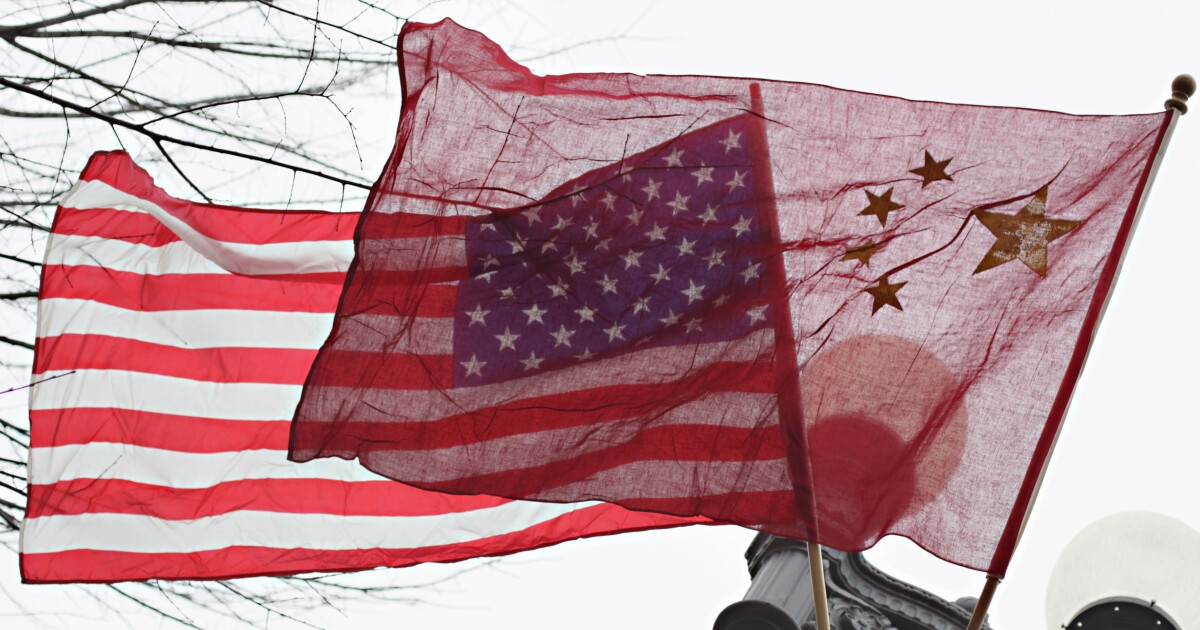

The Biden administration’s tariffs and new tech restrictions on China could cause some blowback to the U.S. economy as Beijing grapples with a serious slowdown.
After barely rising for several months, consumer prices in July actually fell by 0.3% in China, a scenario known as deflation that showed the Chinese economy is sputtering as demand falls. Additionally, gross domestic product growth is slowing and expected to slow after years of breakneck growth, something that has broad economic implications beyond just Asia.
INFLATION COMPLICATES BIDEN’S PATH BACK TO THE WHITE HOUSE
The fact that China is experiencing a slowdown will have a direct effect on the U.S. economy, according to Scheherazade Rehman, a professor of international finance at George Washington University.
And the United States also has tariffs imposed on China, further squeezing its economy. Those tariffs were controversially levied by former President Donald Trump but were continued by President Joe Biden. Rehman said the one-two punch from the slowing Chinese economy combined with tariffs will be felt in the U.S.
“There is nothing good here with this and China slowing down and doing this on top of it, and keeping the Trump-era tariffs on top of that — all of this is not boding well for us,” she told the Washington Examiner.
Adding to Beijing’s economic woes, Chinese manufacturing activity has contracted recently, China’s factory orders are down, domestic travel spending in China is lower, and there is an overall drag on consumption across China.
Youth unemployment is surging in China, an indication of the dire financial straits the country finds itself mired in. The unemployment rate for Chinese 16- to 24-year-olds in urban areas is now over 21%. That is more than double what it was just a few years ago.
China is also facing a property crisis. The government shot itself in the foot by cracking down on the heavily indebted real estate market back in 2020. It did so to reduce the risk to its financial system, but by doing so, it pushed housing prices down, and several companies defaulted.
“And this construction market and mortgage market and housing market has not recovered. If anything, it looks bad,” Rehman said.
Rehman warned that there is the potential, if the right decisions are not made by Beijing, for the Chinese economy to stagnate for a very long time. That would not only have repercussions for the U.S. but the entire world.
Biden has continued the Trump administration’s legacy of maintaining distance between Washington and Beijing. Just this week, Biden signed an executive order to regulate and block high-tech U.S.-based investments flowing toward China.
China answered by saying it has “serious concern[s]” about the move and “reserves the right to take measures” in response.
The first effects of the economic slowdown in China will be felt by U.S. farmers and energy producers.
China imports a huge amount of energy, so any broad-based slowdown in the Chinese economy will result in decreased demand for energy. The moment China starts importing fewer energy products, energy producers will get hit across the board, something that could equate to lost jobs stateside.
China is also the world’s largest importer and consumer of U.S. agricultural products, and if demand for those declines with Beijing’s economy, so does the U.S. agricultural sector. That means lost jobs here in the U.S. in farming and agriculture.
If the slowdown worsens, more parts of the U.S. economy will feel the effects outside of just the agricultural and energy sectors. Rehman said supply chains will be further disrupted and U.S. production in several industries will take a hit and that eventually, U.S. consumers are going to end up spending more.
“We are so intrinsically entwined with this economy that we will hurt ourselves. We will disrupt all our existing supply chains, which is pretty significant,” Rehman said. “We will exacerbate delays in production. … It will force companies and consumers to pay more and not least because reallocation of production can’t happen overnight in the United States.”
Biden has addressed China’s economic issues directly. On Thursday, he labeled China’s economic situation “a ticking time bomb.”
He said Beijing was “in trouble” because of slowing growth and its unemployment rate.
“That’s not good because when bad folks have problems, they do bad things,” he said at a political fundraiser.
CLICK HERE TO READ MORE FROM THE WASHINGTON EXAMINER
But if the push toward decoupling with Beijing continues, it could have a direct effect on the U.S. economy and consumers.
“This relationship is so symbiotic that anytime you try to squeeze your partner, it will end up reverberating back on you,” Rehman said.





